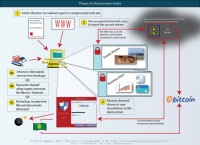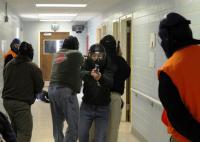-
Tips on how to avoid ransomware attacks

Individuals and businesses have become targets to a growing online fraud scheme known as ransomware. Ransomware is a form of malware used by cyber criminals to freeze your computer or mobile device, steal your data and demand that a “ransom” — typically anywhere from a couple of hundreds to thousands of dollars — be paid. The FBI, ransomware victims lost more than $18 million between April 2014 and June 2015.
-
-
Preparing for the worst case scenario

The number of incidents involving armed attackers (active shooter incidents) has been on the rise over recent years with attacks taking place around the world — from the United States to India, from Norway to France to Kenya. Control Risks says that its Active Shooter training helps increase awareness of the threat and, in the worst case scenario, how best they can protect themselves.
-
-
Terrorism and tourism: what cities should do to prepare for an attack
Citizens of the U.S. and the world were deeply shocked and saddened when a gunman shot and killed about fifty patrons at an Orlando nightclub this past weekend. While the shooter’s primary targets were the people enjoying an evening out, a secondary object of such incidents is typically tourism, with the aim of terrorizing a population so much that people don’t travel there, thereby harming the economy. An examination of how cities and other destinations react to shootings and other situations that negatively affect tourism reveals that there are several important lessons about what cities can do to assure tourists they can maintain their safety. Destinations that take a greater leadership role and provide accurate, relevant, and timely information to their visitors are more likely to win in this zero sum game. Those that are unorganized or silent are more likely to lose. Ultimately, tourists vote with their pocketbooks, and a destination’s relative safety may determine where they take their next trip.
-
-
Global small arms trade reached $6 billion in 2013
The Small Arms Survey’s Trade Update 2016: Transfers and Transparency reports that the world’s “top” and “major” small arms exporters delivered at least $5.8 billion worth of small arms in 2013, an increase of 17 percent compared to the $5 billion worth exported in 2012. The United States exported a record $1.1 billion worth of small arms in 2013. Transfers of small arms to the United States ($2.5 billion) alone accounted for 42 percent of all imports.
-
-
Inside ISIS' looted antiquities trade
For excavators – archaeologists, but also looters like the Islamic State, or ISIS – the opportunity for discovery in modern Iraq and Syria is dazzling. Everyone seems to agree that ISIS is digging up and selling archaeological artifacts to make money. But no one seems to agree on how much money it’s actually making from its illegal antiquities trade: amounts have ranged from $4 million to $7 billion. Patchy data and methodological challenges do not fully explain why $7 billion fell to $4 million in public discussions about the ISIS antiquities trade. While market mystique and over-the-top plot lines are fine for Hollywood films and adventure novels, it’s no way to understand terrorist finance, and without that understanding we are unlikely to arrive at genuine and lasting solutions.
-
-
New alloy to boost rare-earth elements production
Rare earths are a group of elements critical to electronics, alternative energy, and other modern technologies. Modern windmills and hybrid autos, for example, rely on strong permanent magnets made with the rare earth elements neodymium and dysprosium. Yet there is no production occurring in North America at this time. Researchers have developed aluminum alloys that are both easier to work with and more heat tolerant than existing products. The alloys — which contain cerium — have the potential to jump-start the U.S. production of rare earth elements.
-
-
HIPAA audits and what you need to consider to keep your organization compliant

HIPAA has long been a regulation which has been confusing, in many aspects requiring a legal degree to understand the complexity and exactly how to become and remain complaint.HIPAA was enacted in 1996, and it has taken twenty years for it to become the elephant in the room it is today.The regulation has become more sophisticated based on the overwhelming increase in data breaches with the medical industry experiencing the greatest impact.
-
-
NRC asked to shut down Indian Point nuclear plant

Located twenty-six miles from New York City, in the right weather conditions a radiation release at Indian Point nuclear power plant could reach Times Square in as little as ninety minutes, making evacuation of New York City impossible and rendering the area uninhabitable for a long time. Critics of the agiing plant say that the disappearance and disintegration of more than 1 in 4 critical bolts holding the Indian Point nuclear reactor cooling system together is far more serious than owner, Entergy, admits.
-
-
Appalachian coal ash rich in rare earth elements

In the wake of a 2014 coal ash spill into North Carolina’s Dan River from a ruptured Duke Energy drainage pipe, the question of what to do with the nation’s aging retention ponds and future coal ash waste has been a highly contested topic. A study of the content of rare earth elements in U.S. coal ashes shows that coal mined from the Appalachian Mountains could be the proverbial golden goose for hard-to-find materials critical to clean energy and other emerging technologies.
-
-
Changing climate threatens World Heritage, tourism sites
Climate change is fast becoming one of the most significant risks for World Heritage sites across the globe. Many World Heritage sites, designated for their global significance and universal value to humankind, are major tourist destinations. Some are among the most iconic places on Earth.
-
-
It’s easier to defend against ransomware than you might think

Ransomware – malicious software that sneaks onto your computer, encrypts your data so you can’t access it and demands payment for unlocking the information – has become an emerging cyberthreat. Several reports in the past few years document the diversity of ransomware attacks and their increasingly sophisticated methods. Unfortunately, the use of advanced cryptosystems in modern ransomware families has made recovering victims’ files almost impossible without paying the ransom. However, it is easier to defend against ransomware than to fight off other types of cyberthreats, such as hackers gaining unauthorized entry to company data and stealing secret information.
-
-
What Machiavelli can teach us about cybercrime and e-commerce security

Online poker offers new insights into the mind-set of scheming Machiavellians, researchers have found. The researchers show that the card betting game can be used as a novel way to better understand the psychology of strategic deception. The research is part of a broader project looking at break-through research on deception, a basic problem at the heart of cybercrime affecting sectors such as e-commerce and financial services, to deepen our fundamental understanding of how deception works particularly in online settings.
-
-
Study probes impact of terror on business travelers, managers
A joint study of terror’s impact on business travelers and business travel managers revealed surprising results, especially with regard to traveler fears and anxiety. Among other findings, the study found that 31 percent of business travelers worry that a reluctance to travel could hurt their career, and that 6 percent would not feel comfortable expressing their concerns to upper management.
-
-
Update on earthquakes: Newest results from Oklahoma Commission look “encouraging”
The Oklahoma Corporation Commission (OCC), the regulatory agency overseeing the state’s oil and gas industry, now has data that may suggest their directives to owners of production and induction wells have successfully contributed to a decline in seismic activity in the most volatile areas prone to earthquakes.Scientists at the Oklahoma Geological Survey (OGS) continue to remind the public that there are a wide variety of unanswered questions about immediate and long-term remedies even with the new directives in place.
-
-
How Israel became a cybersecurity superpower
Israel’s rise as one of the world’s leaders in cybersecurity has been boosted by cooperation between the military, government, education, and private sectors, a level of partnership unmatched in the Western world. Israel’s cybersecurity sector is now worth half a billion dollars annually — second only to the United States.
-
More headlines
The long view
If Trump Wants More Deportations, He’ll Need to Target the Construction Industry
As President Donald Trump sends mixed messages about immigration enforcement, ordering new raids on farms and hotels just days after saying he wouldn’t target those industries, he has hardly mentioned the industry that employs the most immigrant laborers: construction. Almost a quarter of all immigrants without a college degree work in construction.
Federal R&D Funding Boosts Productivity for the Whole Economy − Making Big Cuts to Such Government Spending Unwise
Large cuts to government-funded research and development can endanger American innovation – and the vital productivity gains it supports. If the government were to abandon its long-standing practice of investing in R&D, it would significantly slow the pace of U.S. innovation and economic growth.
Smaller Nuclear Reactors Spark Renewed Interest in a Once-Shunned Energy Source
In the past two years, half the states have taken action to promote nuclear power, from creating nuclear task forces to integrating nuclear into long-term energy plans.
